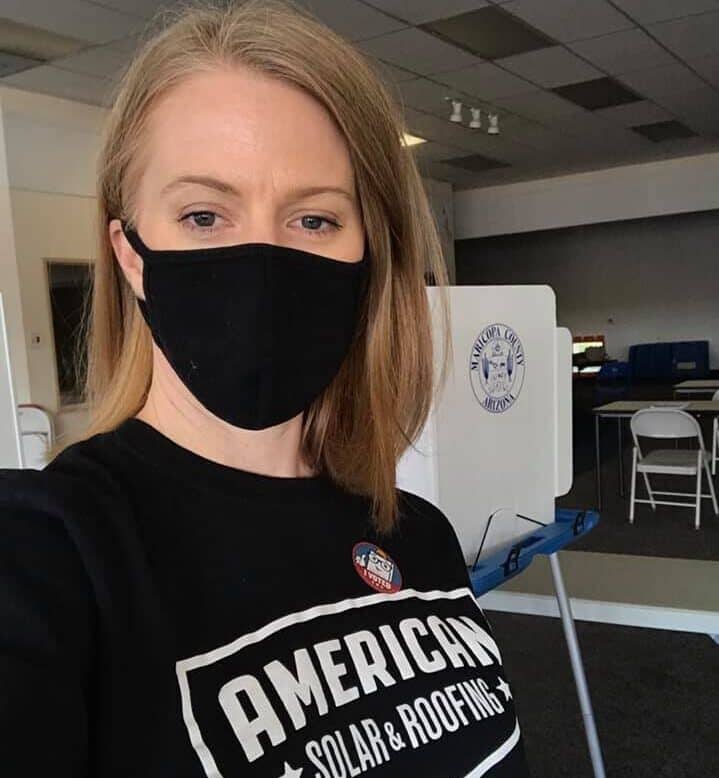July 4th is the day to celebrate our Independence.
On July 4th 1776, the Continental Congress formally adopted the Declaration of Independence, which had been written largely by Thomas Jefferson. Though the VOTE for actual independence took place on July 2nd, from then on, the 4th became the day that was celebrated as the birth of American independence (history.com).
I capitalize VOTE because this past week our right to vote was restricted.
As the CEO of American Solar & Roofing, I am disappointed that the Supreme Court ruled against voting in any form. This will have a direct impact on my employees, the craftspeople who install and service your solar and/or roofing systems.

As you may have seen on our social media pages, I worked at a polling location last year during the Presidential Election. I made this decision because I believe it was my civic duty to support those who wanted to exert their freedom and cast a ballot. For four days my employees managed my company so I could serve America. I needed to be part of this very organized and American process. I honor every single American who voted and all the poll workers who gave their time that day. Lastly, I chose to serve in a community largely represented by minorities, people of color, and the underprivileged. I wanted to help them feel safe when entering a location of unknown so they could vote for their future, just like our Founding Fathers did on July 2nd.
As solar advocates, you know how hard we have fought to make solar viable in Arizona. You know that voting for candidates that support renewable energy and your right to choose solar is important. Voting is your right. It is important. It is crucial. Can you imagine what it would be like if it became more difficult for you to cast your vote? For some Americans, this is exactly the case. The Supreme Court looked at two main voting processes from the 2020 Presidential Election in Arizona. The Court has voted to appeal and remove these two voting processes; thus, making it more difficult for Arizonans to vote. (NPR.org)
Item 1: Picking up the ballots and delivering to polling location. Many homeowners become busy with life. Between doctors’ appointments, family needs, bills, work, and the pandemic last year, many can forget about delivering their ballot to the post office or drop stations. If someone calls and ask, “Would you like me to deliver your ballot?”, as a Voter you should be able to decide. It is your right to choose who delivers your ballot, whether that is physically yourself, a mail courier, or a volunteer.
Item 2: Voting at any polling location. As an AZ native who has voted in every election since I turned 18, I know that finding a polling location is a task. I believe that is something we all can agree on. The website to find the location is hard to find and they are never user friendly. Locations can change from voting year to voting year. Why? Because locations can choose not to be a polling location after one year. The County in which you vote must identify, set-up and pay for that location. If the location chooses not to participate, a new location must be found. Last year, you were able to vote in any polling location within Maricopa County. This made voting much more accessible. Many of my employees took advantage of this and were pleased to know they could vote near their workplace instead of managing voting in their hometown before or after work. Even with regular PTO to vote, it can be difficult to make it in your jurisdiction.
Lastly, I care the most because I see first-hand how my non-white employees are treated. It is my obligation to use my privilege to help elevate their voices. I can say firsthand these craftspeople who work for my company, from installers, to warehouse management, to office managing, deserve the right to vote easily and be treated with respect. They care about making an impact in their community and prove to me they are interested in voting, year after year.
In 2016, Black, Latino and Native American voters were about twice as likely to cast ballots in the wrong precinct as were white voters, Judge William A. Fletcher wrote for the majority in the 7-to-4 decision. Among the reasons for this, he said, were “frequent changes in polling locations; confusing placement of polling locations; and high rates of residential mobility.”
Similarly, he wrote, the ban on ballot collectors had an outsize effect on minority voters, who use ballot collection services far more than white voters because they are more likely to be poor, older, homebound or disabled; to lack reliable transportation, child care and mail service; and to need help understanding voting rules. (The New York Times)
Overall, I believe this disappointing Supreme Court ruling hits the Core Values of American Solar & Roofing and my personal, instinctive values.
At American, we are “Hungry for Achievement”. We are searching for achievement not just for ourselves, but within our teams, across out teams, and for our entire community and state. We know when this is achieved, we all win. We cannot all win if we are holding each other back from casting their vote.
Our team members hold the values of being “Open to Vulnerability” and “Fearlessly Kind”. We cannot succeed in our company or in our community without being vulnerable, without sharing our stories. We take pride in the truth that we demonstrate kindness to each other, to our customers and to our community and planet. We genuinely care for each other and work to provide greater good for all humanity. This Court ruling does not provide good for all.
For my company, because of this decision, I will provide additional Paid Time Off (PTO) specifically to allow my employees to VOTE on election days. I will continue to encourage everyone to vote and to use their voice. Because your voice is important.
– Joy Seitz
CEO, American Solar & Roofing





